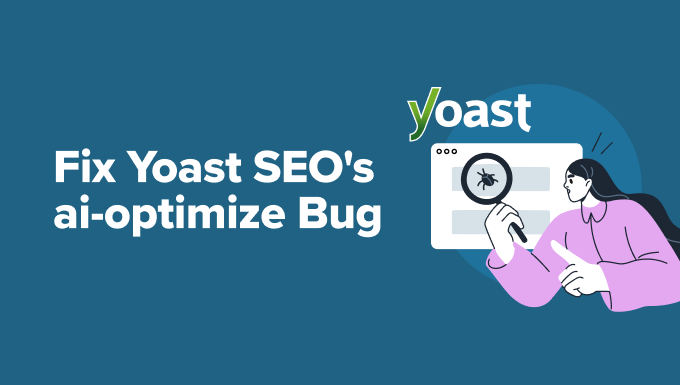Fix Yoast SEO’s ai-optimize Bug Before It Ruins Your Site’s SEO

Yoast SEO’s AI-Optimize Feature: A Promise of Efficiency, A Potential for Peril
Yoast SEO is a cornerstone plugin for countless WordPress websites, celebrated for its user-friendly interface and comprehensive suite of tools designed to improve search engine visibility. Recently, Yoast introduced an AI-Optimize feature, promising to streamline the optimization process by automatically generating title tags and meta descriptions. While the intention behind this feature is commendable – saving users time and potentially boosting rankings – its implementation has been fraught with issues, leading to unintended consequences that can negatively impact a website’s SEO. This article delves into the AI-Optimize bug, its potential ramifications, and actionable steps you can take to mitigate the damage and prevent further problems.
Understanding the AI-Optimize Feature
The AI-Optimize feature in Yoast SEO leverages artificial intelligence to analyze the content of a page or post and automatically generate optimized title tags and meta descriptions. The goal is to provide a compelling and relevant snippet that attracts both search engines and users, ultimately increasing click-through rates and improving search rankings. This feature is particularly appealing to users who are new to SEO or who struggle with crafting effective metadata. It offers a seemingly effortless solution to a crucial aspect of on-page optimization.
The Emergence of the Bug: Symptoms and Signals
Unfortunately, the initial rollout of the AI-Optimize feature was marred by a significant bug. Users began reporting that the AI was overwriting manually crafted, optimized titles and meta descriptions with generic or irrelevant AI-generated versions. This occurred even when the AI-Optimize feature was not explicitly enabled, indicating a deeper underlying problem. The symptoms varied, but the common thread was the unexpected and unwanted modification of existing metadata.
Here are some of the warning signs that your site might be affected:
- Sudden drop in organic traffic: A significant decrease in traffic from search engines can be a strong indicator of issues with your SEO, including problematic metadata.
- Inconsistent or generic title tags and meta descriptions in search results: Check Google’s search results for your pages. If you see titles and descriptions that don’t match what you intended, or if they appear generic and uninformative, the AI-Optimize bug might be at play.
- Discrepancies in Yoast SEO settings: Verify that the title tags and meta descriptions displayed within the Yoast SEO plugin settings for each page and post match your intended versions.
- Errors reported in Google Search Console: Google Search Console often flags issues with title tags and meta descriptions, such as being too long, too short, or duplicated. These reports can provide clues about whether the AI-Optimize feature has altered your metadata.
- Changes in crawlability: Although less directly related, altered metadata can sometimes affect how search engines crawl and index your site. Monitor your crawl stats in Google Search Console for any unexpected changes.
The Ramifications: Why This Bug is Detrimental to Your SEO
The seemingly simple act of overwriting title tags and meta descriptions can have far-reaching and detrimental consequences for your website’s SEO. Here’s why:
- Reduced click-through rates (CTR): Title tags and meta descriptions are the first impression your website makes in search results. If they are generic, irrelevant, or poorly written, users are less likely to click on your link, leading to a lower CTR. A low CTR sends a negative signal to search engines, potentially impacting your rankings.
- Decreased relevance and ranking: Search engines rely on title tags and meta descriptions to understand the content of a page and its relevance to specific search queries. If these elements are inaccurate or unoptimized, search engines may misinterpret your content, leading to lower rankings for relevant keywords.
- Damage to brand reputation: Consistent, well-crafted titles and descriptions contribute to a professional and trustworthy online presence. Generic or irrelevant metadata can erode user confidence and damage your brand reputation.
- Wasted optimization efforts: If you’ve invested time and effort in crafting optimized title tags and meta descriptions, the AI-Optimize bug effectively negates those efforts, rendering your optimization work useless.
- Indexing problems: In severe cases, dramatically altered metadata can confuse search engine crawlers, leading to indexing problems and reduced visibility in search results.
Diagnosing the Problem: How to Determine if You’re Affected
The first step in addressing the AI-Optimize bug is to determine whether your website has been affected. Here’s a systematic approach to diagnosis:
- Review Google Search Console: Check the “Performance” report in Google Search Console to identify pages with a sudden drop in clicks or impressions. This can indicate that the title tag or meta description has been altered, leading to reduced visibility. Also, examine the “Enhancements” section for any errors related to metadata.
- Manually inspect search results: Perform targeted searches for keywords related to your website and specific pages. Carefully examine the title tags and meta descriptions displayed in the search results. Compare these to the intended versions you’ve set in Yoast SEO.
- Audit your Yoast SEO settings: Review the title tags and meta descriptions for your most important pages and posts within the Yoast SEO plugin. Ensure that these settings match your intended versions. Pay close attention to any pages where the AI-Optimize feature might have been inadvertently enabled.
- Check your website’s source code: For a more technical approach, view the source code of your pages and search for the `
